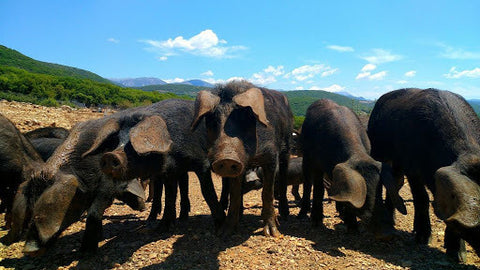
Black pig, a rare Greek breed arrived at siakos.gr
May 16, 2020siakos. gr0 comments
The traces of his tribe in the Greek area reach up to 5,500 BC. according to archaeological findings, bones of a domestic black pig, where they were found in a settlement in Sitagros of Drama. It is probable that it is the first farmed pig in Europe. black pig
The breeding of the black pig is extensive and the animals are born and live in their natural environment with native vegetation of oak, oak, beech, chestnut, fern potatoes, grass, etc. where animals are controlled but free, maintaining their well-being and vitality.
A big difference from conventional intensive pig farming, as well as the number of derivatives differs because while a conventional pig gives birth to 12-14 young, the Greek black pig gives birth to 5-7 young. Conventional pigs are slaughtered at five months, while this at ten. black pig
In the breeding of the black pig, any use of antibiotics-medicines is avoided, as well as any intervention by the producer that would violate the animal's nature, cutting tails, teeth, etc.
Based on analyzes done on the meat of the black pig, it has an increased content of ω3-ω6 fatty acids, as well as more protein and less intramuscular fat. The Lafiotaki farm breeds on a privately owned area of 120 acres, 100% Greek domestic black pig of a rare Greek breed certified by the Athens Animal Genetic Improvement Center of the Ministry of Agricultural Development and Food. The farm is located at an altitude of 750 m, near the Trichonida lake and is the ideal breeding environment for the black pig. Today the Lafiotaki farm vertical unit tries to offer to those who know the quality, fresh meat and the butchery/packing plant, unique products, of excellent quality. black pig
You can find all the parts of the animal, such as shoulder, leg, steaks, neck, pancetta, and even plain or stuffed sausages. Of course you will also find separate recipes, to enjoy the uniqueness and quality of this unique meat.


Comments (0)
There are no comments for this article. Be the first one to leave a message!